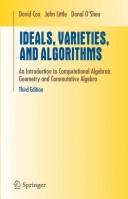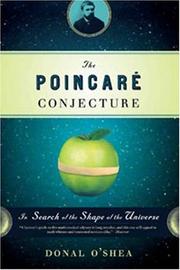| Listing 1 - 4 of 4 |
Sort by
|

ISBN: 9780387356518 Year: 2007 Publisher: New York, NY Springer
Abstract | Keywords | Export | Availability | Bookmark
 Loading...
Loading...Choose an application
- Reference Manager
- EndNote
- RefWorks (Direct export to RefWorks)
Mathematical logic --- Ordered algebraic structures --- Geometry --- Mathematical control systems --- Computer. Automation --- algebra --- landmeetkunde --- wiskunde --- logica

ISBN: 0387356509 1441922571 0387356517 9780387356501 9780387356518 Year: 2007 Publisher: New York : Springer,
Abstract | Keywords | Export | Availability | Bookmark
 Loading...
Loading...Choose an application
- Reference Manager
- EndNote
- RefWorks (Direct export to RefWorks)
Algebraic Geometry is the study of systems of polynomial equations in one or more variables, asking such questions as: Does the system have finitely many solutions, and if so how can one find them? And if there are infinitely many solutions, how can they be described and manipulated? The solutions of a system of polynomial equations form a geometric object called a variety; the corresponding algebraic object is an ideal. There is a close relationship between ideals and varieties which reveals the intimate link between algebra and geometry. Written at a level appropriate to undergraduates, this book covers such topics as the Hilbert Basis Theorem, the Nullstellensatz, invariant theory, projective geometry, and dimension theory. The algorithms to answer questions such as those posed above are an important part of algebraic geometry. Although the algorithmic roots of algebraic geometry are old, it is only in the last forty years that computational methods have regained their earlier prominence. New algorithms, coupled with the power of fast computers, have led to both theoretical advances and interesting applications, for example in robotics and in geometric theorem proving. In addition to enhancing the text of the second edition, with over 200 pages reflecting changes to enhance clarity and correctness, this third edition of Ideals, Varieties and Algorithms includes: A significantly updated section on Maple in Appendix C Updated information on AXIOM, CoCoA, Macaulay 2, Magma, Mathematica and SINGULAR A shorter proof of the Extension Theorem presented in Section 6 of Chapter 3 From the 2nd Edition: "I consider the book to be wonderful. ... The exposition is very clear, there are many helpful pictures, and there are a great many instructive exercises, some quite challenging ... offers the heart and soul of modern commutative and algebraic geometry." -The American Mathematical Monthly
Geometry, Algebraic --- Commutative algebra --- Géométrie algébrique --- Algèbres commutatives --- Data processing --- Informatique --- EPUB-LIV-FT LIVMATHE SPRINGER-B --- Algèbres commutatives --- Algorithmes --- Algorithms --- Algèbres commutatives. --- Algorithmes. --- Géométrie algébrique.

ISBN: 9780387356518 Year: 2007 Publisher: New York NY Springer New York Imprint Springer
Abstract | Keywords | Export | Availability | Bookmark
 Loading...
Loading...Choose an application
- Reference Manager
- EndNote
- RefWorks (Direct export to RefWorks)
Algebraic Geometry is the study of systems of polynomial equations in one or more variables, asking such questions as: Does the system have finitely many solutions, and if so how can one find them? And if there are infinitely many solutions, how can they be described and manipulated? The solutions of a system of polynomial equations form a geometric object called a variety; the corresponding algebraic object is an ideal. There is a close relationship between ideals and varieties which reveals the intimate link between algebra and geometry. Written at a level appropriate to undergraduates, this book covers such topics as the Hilbert Basis Theorem, the Nullstellensatz, invariant theory, projective geometry, and dimension theory. The algorithms to answer questions such as those posed above are an important part of algebraic geometry. Although the algorithmic roots of algebraic geometry are old, it is only in the last forty years that computational methods have regained their earlier prominence. New algorithms, coupled with the power of fast computers, have led to both theoretical advances and interesting applications, for example in robotics and in geometric theorem proving. In addition to enhancing the text of the second edition, with over 200 pages reflecting changes to enhance clarity and correctness, this third edition of Ideals, Varieties and Algorithms includes: A significantly updated section on Maple in Appendix C Updated information on AXIOM, CoCoA, Macaulay 2, Magma, Mathematica and SINGULAR A shorter proof of the Extension Theorem presented in Section 6 of Chapter 3 From the 2nd Edition: "I consider the book to be wonderful. ... The exposition is very clear, there are many helpful pictures, and there are a great many instructive exercises, some quite challenging ... offers the heart and soul of modern commutative and algebraic geometry." -The American Mathematical Monthly
Mathematical logic --- Ordered algebraic structures --- Geometry --- Mathematical control systems --- Computer. Automation --- algebra --- landmeetkunde --- wiskunde --- logica

ISBN: 9780802716545 080271532X 0802716547 9780802715326 Year: 2007 Publisher: New York (N.Y.): Walker,
Abstract | Keywords | Export | Availability | Bookmark
 Loading...
Loading...Choose an application
- Reference Manager
- EndNote
- RefWorks (Direct export to RefWorks)
Conceived in 1904, the Poincare conjecture, a puzzle that speaks to the possible shape of the universe and lies at the heart of modern topology and geometry, has resisted attempts by generations of mathematicians to prove or to disprove it. Despite a million-dollar prize for a solution, Russian mathematician Grigory Perelman, posted his solution on the Internet instead of publishing it in a peer-reviewed journal. This book "tells the story of the fascinating personalities, institutions, and scholarship behind the centuries of mathematics that have led to Perelman's dramatic proof." The author also chronicles dramatic events at the 2006 International congress of mathematicians in Madrid, where Perelman was awarded a Fields Medal for his solution, which he declined
Algebraic topology --- Mathematics --- Mathematicians --- Poincaré, Henri, - 1854-1912 --- Perelman, Grigori, - 1966-
| Listing 1 - 4 of 4 |
Sort by
|

 Search
Search Feedback
Feedback About
About Help
Help News
News